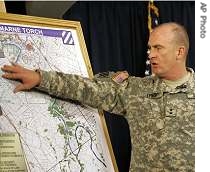2007年VOA标准英语-Senior US Military Officials Present Different
搜索关注在线英语听力室公众号:tingroom,领取免费英语资料大礼包。
(单词翻译)
By Al PessinPentagon
17 July 2007
A report in Tuesday's Washington Post newspaper indicates that at least some military planners believe a U.S. troop withdrawal1 from Iraq would not cause a disaster. But the Bush administration says that is only one view, and it is not shared by many senior U.S. military commanders. VOA's Al Pessin reports from the Pentagon.
The Washington Post quotes the conclusions of a war game exercise recently conducted for the U.S. military by a retired2 Marine3 colonel. The study concluded that if U.S. combat troops withdrew from Iraq in the near future, Shiite militias4 would force many Iraqi Sunnis to move to al-Anbar Province in western Iraq, that there would be a civil war among Shiite groups in southern Iraq, and that mainly Kurdish northern Iraq would become even more autonomous5 than it is now.
The Post quotes the report's author, retired Colonel Gary Anderson, as saying the consequences of a U.S. withdrawal from Iraq would be "ugly," but not "apocalyptic6."
On Tuesday, Pentagon Spokesman Bryan Whitman took issue with that conclusion.
"The people that are closest to it, the commanders that are out there, have all articulated what they believe would be the fairly significant negative consequences of leaving before they were able to achieve what they are out there to do," he said.
 |
| US Major Gen. Rick Lynch briefs the media during a press conference in the heavily-fortified Green Zone in Baghdad |
"It'd be a mess. Those surge forces are giving us the capability8 we have now to take the fight to the enemy. If those surge forces go away, that capability goes away, and the Iraqi security forces aren't ready yet to do that," he said. "So now what you're going to find if you did that, is you'd find the enemy regaining9 ground, re-establishing a sanctuary10, building more IEDs, carrying those IEDs in Baghdad, and the violence would escalate11. It would be a mess."
In addition to the impact inside Iraq, officials warn that other countries in the region could be drawn12 into an Iraqi civil war. And last week President Bush again warned of direct consequences for the United States if Iraq descends13 into chaos14 after a U.S. troop withdrawal.
"What's realistic as well is to understand the consequences of what will happen if we fail in Iraq," he said. "In other words, people aren't going to be content with just driving America out of Iraq. Al-Qaida wants to hurt us here. That's their objective."
Regarding the war game conclusions quoted by the Washington Post Tuesday, the Pentagon spokesman, Bryan Whitman, noted15 that the defense16 department looks at all kinds of potential scenarios17 all the time.
"The United States military studies any number of scenarios quite frequently," said Whitman. "And it's important to conduct those exercises to inform yourselves of the potential consequences of operations, as well as the potential consequences of doing nothing."
Administration officials have repeatedly urged the public, the media and members of Congress to wait until September before trying to judge the president's new Iraq strategy and the relative consequences of a withdrawal or continuing the surge of U.S. forces. That is when the top U.S. military officer in Iraq and the U.S. ambassador are to issue a formal progress report.
 收听单词发音
收听单词发音 




